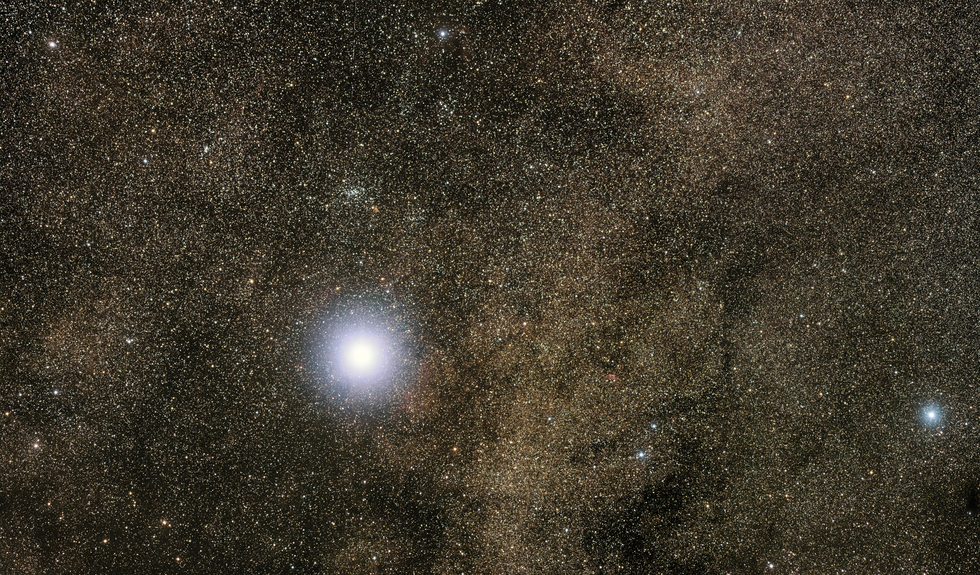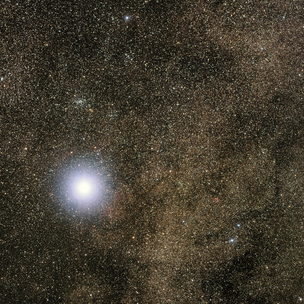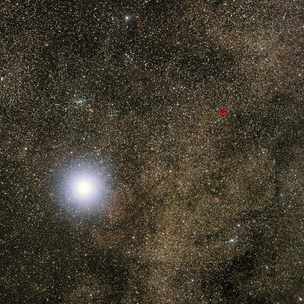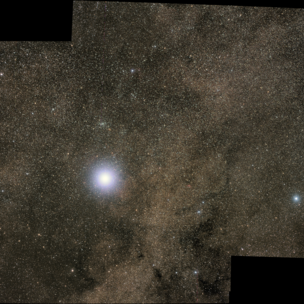Alpha and Proxima Centauri
0
4
Alpha and Proxima Centauri
Proxima Centauri is the nearest star to Earth and part of the triple Alpha Centauri star system consisting of Alpha Centauri A (or “Rigil Kentaurus”), Alpha Centauri B (or “Toliman”) and Alpha Centauri C (or “Proxima Centauri”).
Generally speaking, the three stars in the Alpha Centauri system are 4.4 light-years away. Proxima is the closest of the three at 4.2 light-years.
Alpha Centauri A and B are Sun-like stars (Class G and K), and together they form the binary star Alpha Centauri AB. Their apparent angular separation varies over about 80 years between 2 and 22 arcsec. To the naked eye, Alpha Centauri AB appears to be a single star, the brightest in the southern constellation of Centaurus (and the third-brightest in the night sky, outshone only by Sirius and Canopus).
As seen from Earth, Proxima Centauri is 2.2° southwest from Alpha Centauri AB (i.e. about four times the angular diameter of the Moon).
Proxima Centauri is a red dwarf (Class M), and hence a cooler and dimmer star. Only about 1/7 as wide as the sun, and at a magnitude (brightness) of 11, it is about 100 times too dim to be seen with the unaided eye.
This image shows a 2-panel mosaic from Alpha Centauri AB and Proxima Centauri in the Centaurus constellation. Data from 2 one-click observations from Alpha Centauri and two from Proxima Centauri. Images were captured with the Takahashi FSQ-106ED refractor in Heaven’s Mirror Observatory, Australia (AUS-2).
Alpha Centauri AB is the big, bright star to the left, which forms a triple star system with Proxima Centauri, circled in red.
Total exposure 400 minutes
Alpha Centauri: 4 subs of 600s with each filter (LRGB)
Proxima Centauri: 6 subs of 600s with each filter (LRGB)
Generally speaking, the three stars in the Alpha Centauri system are 4.4 light-years away. Proxima is the closest of the three at 4.2 light-years.
Alpha Centauri A and B are Sun-like stars (Class G and K), and together they form the binary star Alpha Centauri AB. Their apparent angular separation varies over about 80 years between 2 and 22 arcsec. To the naked eye, Alpha Centauri AB appears to be a single star, the brightest in the southern constellation of Centaurus (and the third-brightest in the night sky, outshone only by Sirius and Canopus).
As seen from Earth, Proxima Centauri is 2.2° southwest from Alpha Centauri AB (i.e. about four times the angular diameter of the Moon).
Proxima Centauri is a red dwarf (Class M), and hence a cooler and dimmer star. Only about 1/7 as wide as the sun, and at a magnitude (brightness) of 11, it is about 100 times too dim to be seen with the unaided eye.
This image shows a 2-panel mosaic from Alpha Centauri AB and Proxima Centauri in the Centaurus constellation. Data from 2 one-click observations from Alpha Centauri and two from Proxima Centauri. Images were captured with the Takahashi FSQ-106ED refractor in Heaven’s Mirror Observatory, Australia (AUS-2).
Alpha Centauri AB is the big, bright star to the left, which forms a triple star system with Proxima Centauri, circled in red.
Total exposure 400 minutes
Alpha Centauri: 4 subs of 600s with each filter (LRGB)
Proxima Centauri: 6 subs of 600s with each filter (LRGB)
SPECIFICATIONS
Telescope
AUS2 Takahashi FSQ-106ED
Camera
FLI PL16803
Location
Heaven's Mirror Observatory, Australia
Date of observation
15/6, 27/06 and 12/07/2021
Filters
LRGB
Processing
AstroPixelProcessor, Photoshop CC (incl. AstroPanel 4.2, Astronomy Tools, Topaz Sharpen AI & Denoise Projects 3 plug-ins)





